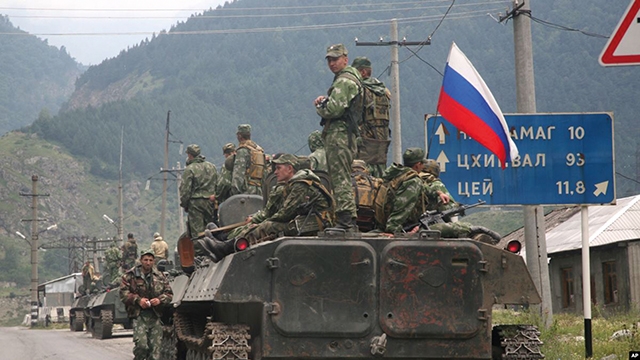Questioning Russia’s Gains in 2008
Since the Russian invasion of Georgia twelve years ago, the Kremlin has been trying to convince the world and the Russian population that the military actions and subsequent recognition of the independence of Abkhazia and the Tskhinvali regions were the only possible and correct actions to be taken. Georgians have a different story: their lands were effectively occupied by Russian forces. These diverging narratives say a lot about how far apart Georgia and Russia have grown in the past decade. But the Russian version is becoming increasingly less attractive as the gains, apart from the military, are hard to grasp and other former Soviet states are becoming increasingly Westward-looking.
It is still unclear what Russia has gained from its military and diplomatic actions since 2008. True, the military presence in Abkhazia and Tskhinvali limited Tbilisi's ability to become an EU or NATO member state. Moreover, Russia’s intervention into Georgia in 2008 also showed the West how far Moscow can go if a strategic decision is made to draw Georgia into the NATO alliance. At the time (August-September 2008) those seemed to be long-term (strategic) victories for Moscow. In the long run though the reversal of Georgian foreign policy did not take place.
So far only a few states recognized Georgia's territories as independent entities. The Georgian public is overwhelmingly anti-Russian in its attitudes. The Georgian public has given up hope (which existed before 2008) for a grand geopolitical bargain – the return of the territories in exchange for reversing EU/NATO aspirations – while the support for the country’s Western aspirations so far has only increased.
In the end, Moscow waged a costly war in 2008 and still experiences a diplomatic burden for its moves against the West. It has still yet to attain its grand geopolitical goal of reversing Georgia's pro-western course. Politicians in Moscow, at least strategists behind the scenes, all understand that Georgia's persistence, which might not seem threatening geopolitically at the moment, could turn into serious business if Russia's geopolitical positions worsen elsewhere in Eurasia.
Indeed, there are signs that Russian influence is set to diminish further across the former Soviet space as the country's economy is unlikely to improve. The Eurasian Economic Union fails to turn into a supra-national body. Its member states are increasingly less confident in the grouping. Ideally, it should have attracted Russia’s major neighbors to serve the peoples of the former Soviet space economically. But Moscow failed to get Ukraine: without Kiev, the EEU, if not dead, is at least a marginal project. The Ukraine crisis itself, Russia’s ambivalent position in Moldova, occasional tensions with Armenia (which leads to persistent distrust in Yerevan) have also played a role. Even in Belarus where there are indications that Russia is purposefully putting pressure on Minsk to get geopolitical concessions, the Kremlin’s influence is shaky. Anything could happen in Belarus, including a radical geopolitical turn westwards.
Imagine a scenario where Russian internal problems (Putin's succession, economic downturns, China's rise, stronger Ukraine, etc.) as well as foreign challenges weigh ever stronger upon the Russian decision-makers in the 2020s. In this case, Georgia's Western aspirations might not seem so bleak and it will be easier for the West to make a strategic decision to draw Tbilisi into EU/NATO. The 2008 war would seem as a mere distraction for Georgia, but a huge, long-term concession for Russia.
Overall, Russia indeed gained immediate military results in 2008 by keeping foreign powers out of the South Caucasus. However, in the wider picture, Russia’s grand geopolitical designs seem less attractive. Military moves could only serve as a partial solution. There is much more needed for Moscow to reverse the pro-western stance in Georgia and correct its positions in Ukraine and elsewhere. In the end it will weigh strongly on Moscow’s strategic calculus. Numerous problems along the borders only complicates the Kremlin’s long-term designs.
By Emil Avdaliani
Source: SLD info












